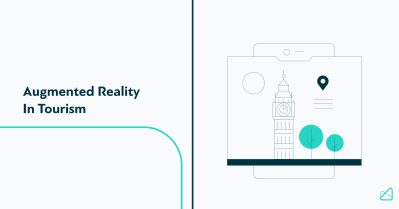Metaverse & Travel Industry: Implications, Pros, Cons, & Examples

The metaverse broke out of the sci-fi books when the CEO of Facebook announced his vision of the social media giant’s future. The metaverse concept is not that new – it has existed since the 90s, and it indicates a virtual world.
However, a metaverse is not just any virtual word but one that is created around social connections and interactions between people. A metaverse can be anything from a video game to virtual and augmented reality. Does it have anything to offer to the travel sector?
Let’s see the pros and cons of the metaverse in tourism and some of the most noteworthy examples.

Metaverse and travel
While the urge to travel is ever-present, the Covid-19 pandemic has shown us that the travel industry is perhaps the most vulnerable to travel restrictions and social distancing. It made the organizations in the travel sector realize the value of technology during the trying times, which resulted in high technology adoption rates.
That’s where the metaverse perfectly fits in. As a bundle of various technologies that enable the creation of virtual worlds, immersive experiences, and ease of use, the metaverse can help both travelers and travel organizations achieve their goals. And what better way to discover those goals than by taking a deep dive into the pros and cons of the metaverse in the travel industry.
Pros and cons
While we are talking about a brand new concept in the travel sector, a couple of obvious pros and cons come to mind.
Pros of the metaverse in the travel industry
The pros of the metaverse in the travel industry come from its power to enhance pre, post, and in-trip purchase experiences.
For instance, the metaverse can play a significant role in taking the booking experience to another level. The OTAs and hotels don’t have too many options for providing information to travelers. They can offer descriptions, images, and videos. With the metaverse, they can offer immersive experiences to travelers and guests.
Travel agents can enable prospects to experience the location they consider traveling to, while hotels can offer realistic tours of their properties to show potential guests what awaits them if they choose them over other hotels.
The metaverse can also facilitate the purchasing decision for travelers. Travelers can use it to explore destinations as if they were there themselves. They can even engage in travel to discover how long it takes to go to the destination or find out the most exciting route to take from one sight to the other.
The most valuable pro of the metaverse is perhaps its ability to increase booking volume. Whether potential guests use augmented or virtual reality to explore hotels, destinations, and means of travel, the chances are that they will get excited and motivated to book a trip or hotel stay. As a result, OTAs and hotels can see a significant increase in booking volume.
Cons of the metaverse in the travel industry
The only con of metaverse in the travel industry is that it can’t replace the real travel experience. The metaverse is limited to visual and audio cues.
While it’s still the best way to keep potential customers informed about the offer, many things can’t be communicated through the metaverse – that unique feel of the air in the destination, the taste of food, the warmth of being bathed in the sunlight, and so on.
Examples of the travel industry in the metaverse
Here are some examples of the travel industry in the metaverse so that you can understand its benefits and potential to change the sector forever.
Go back in time with ease – The metaverse can help offer something brand new to travelers; explore the most famous world’s destinations back in time. Imagine being able to explore Machu Picchu alongside native Incas or vines of the great pyramids of Giza as they were being built?
Smart destination shopping – The metaverse can facilitate the shopping decisions for potential customers through VR. You can enable your potential customers to walk the streets of the cities, take a hotel tour, and even experience traveling to a destination.
Facilitate accessibility of online events – The metaverse can also help the travel sector bring more people to online trade shows and expos. The best thing about it is that it enables social interactions in real-time so that visitors can interact with the exhibitors, ask questions, and see brochures, all in real-time.
Streamlined tour guiding – Augmented reality is a huge thing in the metaverse. Travelers can use AR to find out details about any specifics regarding the destination they are interested in. In fact, AR can serve as a tour guide on-demand, thus facilitating the booking decision.
The metaverse is slowly but surely penetrating industries one by one, and it seems that the travel industry stands to get a lot from it. It can help increase the booking volume, take the shopping experience to a new level, and delight the potential travelers with new and immersive experiences.
Subscribe to
our newsletter
Yay! You are now
subscribed to our
newsletter
Mize is the leading hotel booking optimization solution in the world. With over 170 partners using our fintech products, Mize creates new extra profit for the hotel booking industry using its fully automated proprietary technology and has generated hundreds of millions of dollars in revenue across its suite of products for its partners. Mize was founded in 2016 with its headquarters in Tel Aviv and offices worldwide.
Related Posts

Your Ultimate Guide to B2B Travel Solutions
17 min. You’ve probably noticed that B2B travel solutions play a vital role in the global B2B travel sector. We are talking about the market bound to reach the size of $4952.96 by 2028. That’s a CAGR Growth of 17.51%. No wonder leading B2B travel solutions process over 80.000 bookings and 14.000 searches a day. […]

5 Ways Augmented Reality is Enhancing the Tourism Experience
20 min. Augmented reality (AR) can truly transform the way people discover and explore new places. By combining physical exploration with digital elements, travelers are able to gain deeper insights into different cultures while making memories along the way. In today’s world, more and more travelers are turning to technology to add excitement and convenience […]

Everything You Need to Know About Virtual Tourism Companies
24 min. Virtual tourism refers to a specific tourism niche using technology that enables travelers to experience activities, locations, and destinations without leaving their homes. The types of virtual tours depend on the multimedia format offered to travelers. It can be anything ranging from still images, video, and audio to interactive virtual reality. The popularity […]